Gluten: what is it and why is it harmful, the list of products in which it is contained?
Content:
- Gluten - collective name
- Where is gluten contained?
- List of Traditional Gluten Free Products
- Where can I find traces of gluten?
- What gluten products are definitely not in
- What is gluten intolerance?
- Celiac disease and hypersensitivity to gluten: what is the difference?
- Gluten Harm: Reality or Marketers Scary Tale?
- Gluten Free Trend
- Common Gluten Misconceptions
- Should I switch to a gluten-free diet?
In many European countries, the USA, Canada and Australia, manufacturers mark products with “- (non) gluten”. In recent years, similar products can be found in domestic stores. Many people have negative associations with this word: if there is a warning, then the component is dangerous to health. It's time to find out what gluten is, in which products it is contained and whether it is deservedly accused of various diseases.
Gluten - collective name
Gluten is any vegetable protein that consists of glutenin and gliadin. From the Latin language the word "glue" is translated as glue. Therefore, the substance has an alternative name - gluten. It has the following properties:
- improves the taste and aroma of bakery products;
- allows viscous dough to turn into a lush crumb;
- thickens the consistency of the products of which it is a part.
People have consumed cereals containing gluten for millennia. Plant protein is well absorbed by the body of a healthy person, provides the need for amino acids, gives a feeling of satiety.
Many people know that gluten is present in cereals. The leader in the amount of this nutrient is wheat. Up to 80% of its mass is gluten. Do you know that the average person’s diet for 2/3 consists of gluten products?
Where is gluten contained?
Due to its consistency, a thick “sticky” protein is added to sauces, dairy desserts and other products as a thickener. In addition, in the food industry for the manufacture and packaging of various goods often use the same equipment. So gluten accidentally enters food in which it was not originally there.
List of Traditional Gluten Free Products
In nature, gluten is present only in some cereals. The table below contains information on the amount of nutrient in 100 g of the product.
Table 1. What foods contain gluten
| Name | The maximum amount of gluten per 100 g |
|---|---|
| Wheat and cereals from it: semolina, bulgur, couscous | 5 g |
| Rye | 2.5 g |
| Barley and cereals from it: barley, barley | 2.8 g |
| Millet | 1.7 g |
| Spelled | 1 g |
In nature, oats contain vegetable protein avenine. However, in the production of conventional oatmeal, the same equipment is used as for wheat. Gluten enters the finished product. As a rule, the content of this nutrient in 100 g of oatmeal is 2 g.
Gluten goes from flour to bakery products, instant cereals, bran, pasta. Such foods are traditionally considered gluten-free.
Where can I find traces of gluten?
If for some reason you decide to follow a gluten-free diet, get ready to carefully read the labels on the goods. The following names should alert you:
- modified starch (often contains traces of wheat);
- thickener;
- E-additives: E-106b, E-150, E-160, E-436, E-965 and others.
Gluten is contained in a large list of sausages, semi-finished meat products (meatballs, dumplings, minced meat), mayonnaise, ketchup and other sauces, crab sticks, vodka and beer.
In addition, traces of gluten may be present in the following products:
- chocolate (especially milk), chocolates;
- milk powder, cottage cheese, yoghurts, butter;
- fruit jam, syrup;
- dried fruits, nut mixes, candied fruits;
- French fries, as it is often fried in the same vegetable oil as donuts, chicken breadcrumbs;
- canned vegetables.
The body of a healthy person does not react in any way to food with a small amount of gluten. But for a patient with celiac disease (which will be discussed below) even 1-2 g of protein can cause serious harm.
What gluten products are definitely not in
Since gluten is a vegetable protein, it cannot be found in food of animal origin (with the exception of processed).
Product Examples:
- meat;
- a fish;
- eggs
- seafood.
"Milk" under suspicion, as gluten acts as a thickener. If we consider cereals, then gluten is definitely not found in rice, corn, buckwheat, quinoa, peas and beans.
Gluten bypassed also fresh fruits, vegetables and berries, mushrooms. Supporters of a gluten-free diet often replace a side dish of popular cereals with boiled potatoes.
What is gluten intolerance?
Gluten intolerance has an official name - celiac disease. This is an autoimmune disease. It is quite rare - in 0.5–1% of cases and is usually diagnosed at an early age.
For people with celiac disease, gluten is poison. When plant protein enters the digestive tract, the body perceives it as a foreign body and begins to actively produce protective cells - lymphocytes. The latter enter the intestines and smooth out the small villi responsible for the absorption of nutrients: vitamins, trace elements, organic acids.
As a result, a person does not get anything useful with the product. Undigested food enters the intestines, begins to rot and poison the body.
The following symptoms worry a celiac patient:
- bloating;
- upset stool;
- weakness;
- swelling;
- headache, migraine;
- irritability.
In the future, due to the use of gluten-containing products, the skin becomes dry, hair becomes brittle. There is a deficiency of vitamins and minerals, especially iron. Immunity weakens, a person becomes lethargic, exhausted.
If you suspect celiac disease, take a special blood test in the laboratory (to determine autoantibodies) and do a bowel biopsy. An accurate diagnosis can only be made by a gastroenterologist.
Celiac disease and hypersensitivity to gluten: what is the difference?
In simple terms, celiac disease is a mistake in the immune system. And the causes of gluten sensitivity are usually digestive problems. Examples:
- lack of the enzyme responsible for the breakdown and assimilation of gluten;
- irritable bowel syndrome;
- dysbiosis.
Symptoms with sensitivity to gluten are usually smoothed out, and a person may not be aware of the problem. From time to time, flatulence, bloating, intestinal cramps, nausea, lethargy disturb him. But he blames everything on the poor quality of food or shattered nerves.
It is difficult to diagnose pathology. In some cases, it disappears after a successful cure of gastrointestinal disease. In the United States, gluten sensitivity was found in 5% of Americans.
If you want to make sure of the presence or absence of a disease, keep a food diary. Eliminate gluten-free foods from your diet for a month and record your feelings. Then put the gluten back on the menu. A sharp deterioration in well-being is an occasion to visit a doctor.
Gluten Harm: Reality or Marketers Scary Tale?
Is it true that gluten is harmful to children and adults? Gluten-free diets are especially popular in the USA.There, gluten-free foods exclude 30% of people from the diet. Gluten is accused of inflammatory processes of the digestive tract, obesity, diabetes, vitamin deficiency, infertility. However, many doctors have a different opinion.
Gluten Free Trend
Gluten-free products and cosmetics are a gold mine for entrepreneurs and marketers. First, they scare people with horror stories about the harm of gluten, and then they successfully sell special products.
As a rule, gluten-free sweets and pastries are 2 times more expensive than usual. But this does not mean double benefit. To compensate for the lack of gluten, which has valuable nutritional properties, a lot of sugar, fat and baking powder are sometimes added to products.
Gluten-free cosmetics are even more interesting. In the presence of celiac disease or sensitivity to gluten, the body suffers only when plant protein enters the intestines. People do not use creams, tonics and shampoos inside. Therefore, the mark on cosmetics “Gluten Free” is about the same as mineral water without GMOs.
Common Gluten Misconceptions
Let's look at the main myths that are found among fans of gluten-free food.
- Is gluten harmful to everyone?
Indeed, some people have digestive problems that recommend a gluten-free diet. And people suffering from celiac disease, gluten is contraindicated.
At the same time, there is no scientifically substantiated evidence that gluten is the cause of gastrointestinal diseases, immunity disorders, metabolism, and the reproductive system. If you do not have celiac disease or sensitivity to gluten, then an independent transition to gluten-free nutrition will be a mistake.
You simply deprive the body of many beneficial substances that are present in gluten-free foods. For example, wheat contains a complete set of essential and non-essential amino acids, rich in B vitamins, magnesium, phosphorus, and iron.
- Gluten free - the cause of obesity?
Plant protein alone does not lead to the deposition of fat cells. In contrast, wholesome protein foods help build muscle and improve body shape.
The cause of obesity is simple carbohydrates, which are found in premium flour. In addition, many baked goods (especially cakes, pastries, cookies) have a lot of fat and sugar.
A gluten-free diet helps to lose weight not because of a lack of gluten in the diet. If you replace traditional baking with high-calorie products from rice, corn or other flour, dried fruits and nuts, the weight will remain the same or continue to grow.
- Does gluten stick to intestinal walls?
And if it sticks, it prevents the body from absorbing vitamins and minerals from food. However, the gastroenterologist will say the opposite. The intestinal walls are composed of a large number of motile villi coated with mucus. Nothing can stick to them physically, not even plasticine.
Should I switch to a gluten-free diet?
For people with celiac disease or gluten sensitivity, a gluten-free diet is a necessary step to maintain health, protect and restore intestinal tissue. It is important to balance the diet according to the composition of vitamins and minerals.
Be sure to include brown rice, corn grits, buckwheat, potatoes, fruits and berries in the menu. Try to cook dishes yourself from simple products, and not be bought by semi-finished products for a week. Carefully examine product labels for signs of gluten.
Some tablets may contain traces of wheat starch in their shells.
Do healthy people need a gluten free diet? Not. And there are at least three reasons for this:
- There is no scientific evidence to support the use of a gluten-free diet for the prevention of autoimmune diseases. The culprits of inflammatory reactions in the body are sugar and fats, which are found not only in flour products, but also in gluten-free products (caramel, fried pork).
- Special cases do not apply to everyone. For example, 0.6% of Americans are allergic to peanuts. But this does not mean that this product will be harmful to all people on the planet.
- Gluten-free nutrition depletes the diet, as a person has to give up many healthy foods from wheat, rye, oats and barley.
In addition, a careful check of each product for traces of gluten can cause a nervous breakdown. This is from the same opera as the endless calculation of calories on a calculator.
Thus, gluten is not such a terrible component, as marketers and some nutritionists draw it. It poses a serious threat to patients with celiac disease and is potentially harmful to people who have diseases of the digestive tract. If you do not have the health problems described above, the list of products with gluten should not scare you - leave them in the diet.
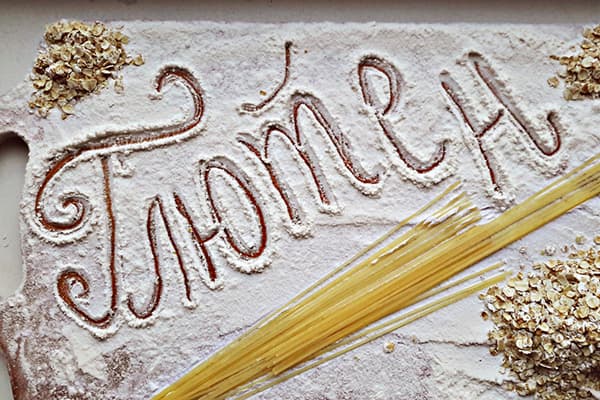
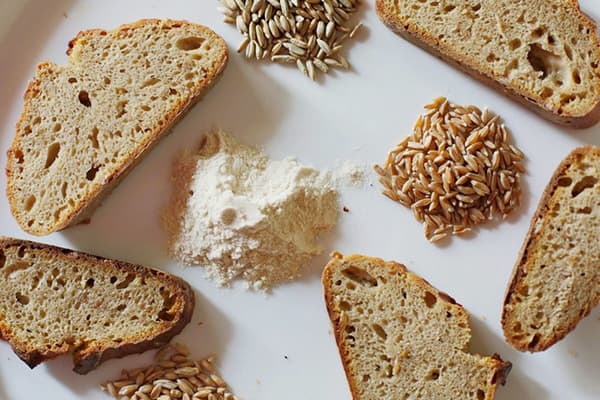
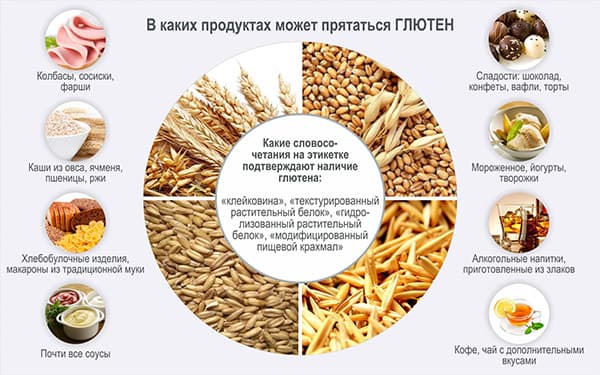
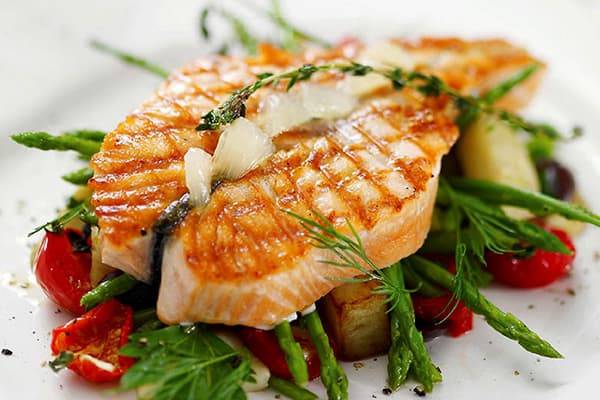

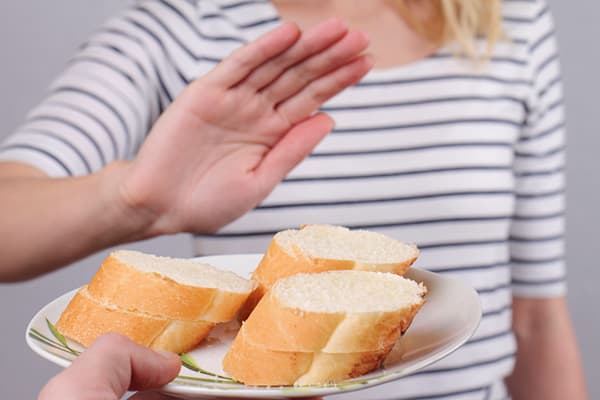

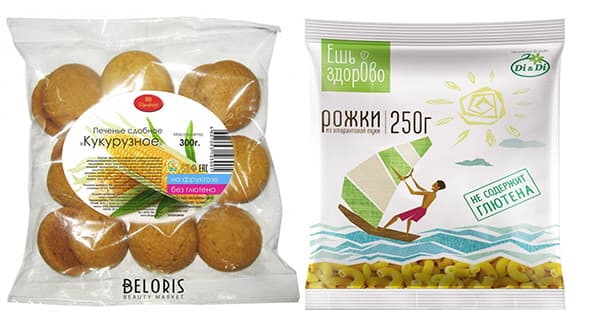
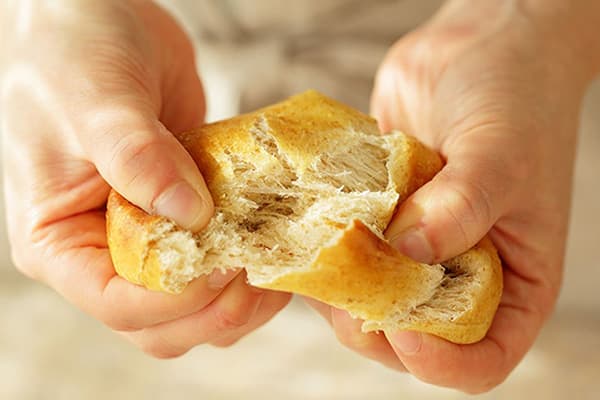

What obscurantism again? Gluten, also gluten, is a complex protein of plant origin, which is part of wheat, barley and other cereals.
The percentage of gluten in flour determines its quality - the higher the percentage, the better the product. The highest quality is wheat flour, where the gluten content is 80%. ... As I saw a packet of salt with the inscription that in their "salt" more calcium than sodium. Or another example of idiocy. When on the packaging of vegetable oil they write that without cholesterol. Or this "masterpiece" from the author-moron about gluten.)))
If there are no special diseases, forget about gluten. This is just a mod. No one has died of bread yet. Ask the blockade. But from overeating, you can get mad.